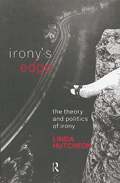

 if i were to continue in a study of irony i would leave behind wayne booth, whose palpable dismay at the unstable-covert-infinite irony in the work of samuel beckett i do not share, and take up the more recent studies of linda hutcheon and claire colebrook. (all these texts are fully searchable online at amazon.) nevertheless, i found a passage in booth's rhetoric of irony (1974) that i think speaks very well to the orientation of my own poetics, namely a preference for metaphor over irony:
if i were to continue in a study of irony i would leave behind wayne booth, whose palpable dismay at the unstable-covert-infinite irony in the work of samuel beckett i do not share, and take up the more recent studies of linda hutcheon and claire colebrook. (all these texts are fully searchable online at amazon.) nevertheless, i found a passage in booth's rhetoric of irony (1974) that i think speaks very well to the orientation of my own poetics, namely a preference for metaphor over irony: . . . metaphor is essentially "additive"; nothing of importance in "the words themselves" need be discarded en route to understanding. The consequence is that when metaphor is made into the central poetic category, no paradox results. The essential metaphoric act is a putting together, a synthesis of what had not been unified before; when larger and larger elements are thus unified, when finally the universe itself is seen as one grand Metaphor for Itself, there is no problem in claiming, like Coleridge, that it is all held together by the Great Imaginer himself.it was of course only two years previous that john ashbery wrote famously, "I thought that if I could put it all down, that would be one way. And next the thought came that to leave all out would be another, and truer, way" ("the new spirit," in three poems, 1972). jack spicer of course countered this earlier in his "imaginary elegies" with the injunction "poet: be like god."
But when irony refuses to keep in place, when it becomes increasingly like an end in itself, paradox is inescapable. And the paradox is not just of that happy rich kind which the ironist seeks--the perception of wheels within wheels, the vertiginous but finally delightful discovery of depths below depths; it is a paradox that can weaken and finally destroy all artistic effect, including the perception of paradox itself. Since irony is essentially "subtractive," it always discounts something, and once it is turned into a spirit or concept and released upon the world, it becomes a total irony that must discount itself, leaving . . . Nothing. [177-178, Booth's ellipsis]
booth overstates his case in some respects. (his "Great Imaginer" and "Nothing" are hypothetical extremes that language merely approaches asymptotically.) he is correct in that no particular degree of literacy or competence is necessary to interpret a metaphor; "no symbols where none intended" as beckett insisted in his early novel watt. a metaphor is what it says, it does not intend to trick or dissemble. but booth is wrong when he says "no paradox results," indeed paradox can and often does result from metaphor, but that is primarily because the fruits of metaphor may not correspond to anything immediately verifiable or knowable from lived experience; this is parts of its creative power. thus i'd want to nuance booth's statement that the "essential metaphoric act" is not simply "a synthesis of what had not been unified before" but a creation of what had not existed before.
"arctic honey," from the opening line of john ashbery's poem "leaving the atocha station" ("The arctic honey blabbed over the report causing darkness") is my favorite example of this. this entity may perplex the reader at first, if only because it corresponds to nothing s/he immediately knows or recognizes from experience. in fact, "arctic honey" is exactly what the reader suspects the words are, mean and want to say: something cold, sweet, golden, translucent, viscous, etc. that had not existed or been thought to exist until before the poem.
metaphor is creative, affirming and inclusionary. irony is certainly useful, as there are many things in this world that need to be destroyed, negated and excluded. but in the end i want something that was not there before.

1 comment:
hmm. this makes me wonder if metaphor & irony as seperate categories of experience really hold. I see the usefulness in the approach, but is metaphor really "Appolonian," and irony "Dyonisian" in some way . . . The terms you're using bring that discourse to mind for me. I tend to think that the paradox either is capable of can be seen as, i.e. experienced as, inclusionary. Perhaps irony sets questions of intentionality in higher relief-- perhaps --and thus problematizes the combinatory that Booth alludes to. Any case, good stuff, glad to read it.
Post a Comment